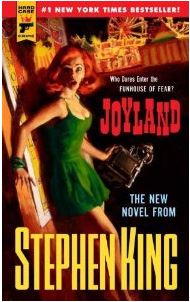
 Loved it. I read it in less than two days, which is so, so fast for me. I stayed up until 4:30 in the morning reading last night. I had to know what happened. Briefly, the story takes place in 1973. The narrator remembers back to a summer job he had while on break from college. He takes a job at an amusement park (Joyland) and the fun begins. There's the ghost of a young woman who was murdered by a serial killer four years earlier. But is there really a ghost? And who is the killer? And how do a little boy with muscular dystophy and his hot mom figure into the tale? It all weaves together perfectly. That's all I'll say.
0 Comments
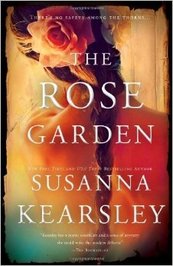 This is the fourth book I've read by Susanna Kearsley and it did not disappoint. Eva returns to Cornwall, to Trelowarth, the house where she spent her summers as a child. Her friends, now grown, still live there and she is happy to be "home" with them. Only it isn't really the same and soon she discovers that she is drawn back in time, to Trelowarth in 1712, where she meets the Butler brothers, one of whom she falls in love with. There is much to be feared, however. They are smugglers and part of a dangerous conspiracy to restore James Stuart to the throne of England. Eva has no control over when she is taken to the past and when she is returned to her own time, but in the end finds she must make a decision about where she wants to be. The set up of this book is a bit slow, but rich with lovely images. Once the paranormal aspects of the story fully kicked in, I was swept away. I enjoyed the characters and found the story to be a real page turner. I gave this book five stars on Goodreads. 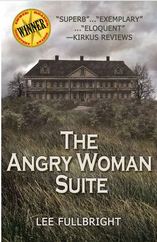 Okay, I could probably write a book about this novel, it brought up so many thoughts. And, I suppose, that's what I liked most about it. There was lots to analyze. If you want a mindless read, don't read this book. As someone who skims when an author gets too wordy about something that doesn't need tons of attention, I must say I didn't skim at all. If I did, I would miss something important. The story is told from the viewpoint of several generations of people, the youngest born in 1950, the oldest born in 1880. It's the story of how a family interacts with each other in dark and dysfunctional ways, keeping secrets that involve murder and insanity. On the underbelly side of this tale, it's the story of personalities and how people do what they do to cope with who they are, hide truths from themselves and others, and make choices that have consequences. On the downside, it was tough getting into this book because the first narrator is Elyse (born in 1950) and she's talking about things the reader can't understand yet. Frankly, it was annoying and until I got past the opening and oriented to what this book was about, I almost didn't read it. Also, sometimes the author was too obscure for my taste. She would tease the reader with information and then not make it fully clear what happened. You had to keep reading to find out. That annoyed me a few times. And then I have to admit I found some of the surprises she dished up implausible. But, hey, it made for good storytelling. I'll go with it. I thought maybe, some of these characters were people the author knew, they were that complex. Francis is unlikable and the author never tries to make up for his failings by giving him redeeming qualities. He isn't bad in the sense that he's a serial killer. He's a master at self-pity and that's his downfall. Still I wanted to read his point of view about things. He's fascinating. I couldn't relate to much in this book. I thought I would because of the Elyse character which is what made me get the book in the first place. She was born in 1950 and I was born in 1952. However, her experiences were nothing like mine. She didn't even like it when the family moved to a street with 40 kids living there. I did relate to the part where her family is taught to feel superior to the Baptists on the street because her family had become Roman Catholic. My family was Protestant and the Catholic lady down the street made it clear what she thought of us. In the end, answers to mysteries are revealed and the story lines tied up. I found the novel intriguing and gave it 5 stars on Goodreads. 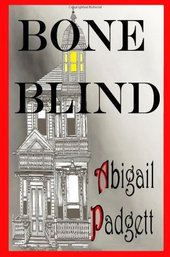 When I first started reading this book I thought for sure I'd found a book that was a home run. The plot drew me in right away. The author knows how to put words together and layered characters that were unique and real. Never once did I not want to finish reading this book. I had to know what was going to happen. But as I got closer to the end of the story, things crumbled a bit. I thought Finn was an idiot for not telling Yost (the detective) everything he knew. Tally got to be too screwy and I never cared if she and Finn united in the end of the story. In fact, I thought they were better off without each other. The detective's total about-face from having to solve a twenty-year-old cold case before he retired to not caring all that much was annoying and didn't ring true. And there were a few other bothersome things. Pages and pages of Finn and Yost being in their heads analyzing who committed the murder got tedious. And a writer of this caliber (she really is top notch) shouldn't have head-hopping going on; she should know the difference between blonde and blond and she should know how to use quotes when a character's dialogue continues to the next paragraph. But in the end, I'd say the pros outweigh the cons. The story is engaging and the writing excellent. I'm glad I read this book and I'd recommend it to others who like mysteries and weird characters. I gave this book 4 stars on Goodreads. 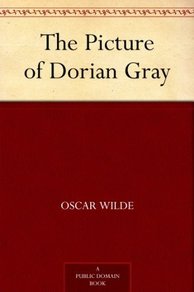 I would give this book 10 stars out of 10 for the concept. The human desire to remain forever young seems to be ingrained in us. Add to that the idea that we can hide our sins but they still count against us somewhere is, in my opinion, truth. The other thing I loved about this book is that it is thought provoking. Man, did lots of thoughts go through my mind as I was reading. I’ve read reviews or introductions of this book that say Dorian Gray was a sociopath who sold his soul to the devil for eternal youth. I don’t think he did. He wished for something and it came true. It wasn’t because he thought things through, believed it would happen and said, “Okay, it’s a deal.” I don’t think he was a sociopath. This is what makes the tale a horror story. What if supernatural forces took away your humanity and made you heartless? What if you couldn’t control it? It seemed to me that Dorian did not start out a bad person, and even though his actions became abhorrent, especially when he committed murder, he seemed possessed. The fact that he wanted to change at the end of the story, whether he could or not, made me think he was more human than psycho. Does a sociopath ever desire to be different? Would a sociopath fear a painting where his or her sins are visible? I think he or she might relish in such a thing and smugly think, “Look what I’m getting away with.” Dorian cringed at the sight of the painting and not just out of vanity. Then there is Lord Henry Wotton and his witty bull crap. I kept thinking, if you are a person with a high IQ and you say outrageous things with complete confidence, slipping in something that might be true here and there, will people start to believe everything you believe is correct? Here are a few quotes from the book, some from Lord Henry, some from Wilde’s narrative. In a couple of places I’ve added my thought in parentheses: “There is only one thing in the world worse than being talked about, and that is not being talked about.” (I’m thinking Miley Cyrus here.) “When one is in love, one always begins by deceiving one's self, and one always ends by deceiving others. That is what the world calls a romance.” “Children begin by loving their parents; as they grow older they judge them; sometimes they forgive them.” “Nowadays most people die of a sort of creeping common sense, and discover when it is too late that the only things one never regrets are one's mistakes.” “Never marry at all, Dorian. Men marry because they are tired, women, because they are curious: both are disappointed.” “Those who are faithful know only the trivial side of love: it is the faithless who know love’s tragedies.” He was gathering his harvest while it was yet spring. (Made me think of the people who envy another’s success even when that other person earned his or her success through years of practice and time and money spent, while the envious did nothing but wish and hate because of their jealousy. The jealous want a harvest either without ever having sown or they think they've earned it too soon.) “There is a luxury in self-reproach. When we blame ourselves, we feel that no one else has a right to blame us.” (I have to admit I’ve done this.) This book does have weaknesses and I think it is in the storytelling. Okay, how do you judge a book written in another era for people of that time? Some references in the story, I didn’t understand and that’s when I lost interest. Obviously, Oscar Wilde was well read and very smart, so this is no doubt a frailty of mine. I kept thinking, however, they remake movies. Someone should rewrite this in today’s contemporary style. I’m not talking theme, I mean the whole story. I think it would be fascinating. Instead of all the passages about how Dorian passed his time with literature and art, I would have liked to see more of Dorian’s sins in the making. It seemed to me that a lot, if not most, of the horrible actions he took were vaguely referenced. So, for these last two reasons I gave this book 4 stars out of 5. 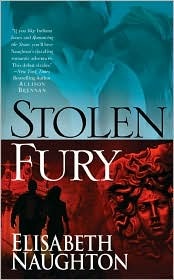 "Stolen Fury" has a lot of strengths and a number of weaknesses. I almost quit reading it halfway through but kept going. I hate not finishing something I start. What didn't I like? The repetitiveness. The two main characters couldn't look at each other without rehashing their feelings and sexual attraction every time. I mean, over and over and over and over and over and well, you get the idea. There were times when I didn't care too much for the two main characters, especially Lisa. I like strong-willed people, but it's good to have some wisdom in conjunction with "I'm not listening, I don't care what you say." Also, they're thieves. I didn't care if they got what they were after. And Rafe's reason for stealing for money seemed contrived. But, I have to say, the ending made up for their character flaws. They both learned and did the right thing in the end, so that is a plus. The ending also had a number of surprises that I enjoyed. I gave this book 3 stars on Goodreads. 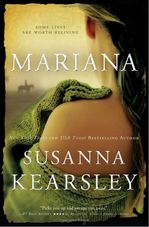 After reading Kearsley's disappointing The Shadowy Horses, I was so happy to read this book by her. It was absolutely wonderful and I, a slow reader, read it in a couple of days. To use a tired phrase, "I couldn't put it down." Briefly this is the story of a woman who is drawn to a large, old farm house in the countryside of an English village. She buys the house and slips back and forth through time. She must put together the pieces of a life lived in the old house centuries earlier while figuring out her heart in the present. This story is masterfully told, haunting, romantic, and fascinating. 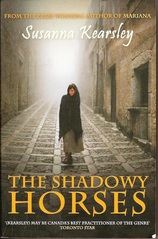 To use a quote from this book about a movie Kearsley's character watches, this story has "...a murky plot and a pace that dragged intolerably." I loved Kearsley's The Winter Sea. I was hoping for the same experience here, but it never came. Susanna Kearsley is a talented writer and her prose was wondrous but many times it caused the story to drag and sometimes I had to reread a passage to be certain of what the author was trying to tell me. I never got lost in the story. In fact, even though I liked the characters and I did care about them, I didn't CARE. I mean, I wanted their archaeology dig to be as they wanted it to be, but in the long run, did it matter? It seemed little was at stake. Never did I get so involved that I read and read and lost myself in the plot or characters. I kept wanting the story to get where it was going, but I didn't know where it was going and I don't mean that in a good way where you're asking yourself, "What's going to happen next! I must find out." I mean it in this vein, "What is the point of all this?" Well, it turns out The Shadowy Horses has a point and a clever climax. It's just that the whole plot is so subtle I had no idea danger was lurking. That may be a good thing for some or even many, but I would have liked a bigger hint that these people (or some of them) were in big trouble. I gave this book 3 stars out of 5 on Goodreads and Amazon. Edited Synopsis from Amazon: Fifty-seven year old Robert Malone is the CEO of a successful clothing store chain and married to a former model. When his doctor tells him he is dying of cancer, he chooses cryonics. His frozen body will be stored in liquid nitrogen for the next seventy-five years, and then he'll wake up in the future. That is, if technology develops a way to bring him back. What he doesn't realize is that he won't lie in some dreamless state all that time. His soul will be very much awake. As Robert begins a new kind of life outside his physical body, he discovers that he can ride in the cockpit with the pilots, but he can't turn the page of a magazine. He can sit in the oval office with the president, but he can't prevent a child from dashing in front of a car. He doesn't work, or eat, or sleep. He can't smell, or taste, or touch. These obstacles make it difficult to experience love, and virtually impossible to reconcile with the living. Over the next several decades, Robert Malone will have plenty of time to figure out The Ups and Downs of Being Dead.
My thoughts: This is a strange, imaginative and different take on being dead. Funny (ha ha) at times, thought provoking and serious at other times, and a little tedious in places as well. This is NOT serious science fiction. So if you're looking for that, don't disappoint yourself (as a few reviewers have commented). This is the story of how one person evolves into a better person even though he's dead. SPOILER ALERT! Near the end I lost some of my suspension of disbelief. I personally don't believe the world will ever reach a state of nirvana, meaning no crime, no death -- things like that. And, sorry if this offends anyone, but I don't believe we should get to the point where there is no death. I believe we are suppose to move on to other experiences. No death would be the opposite of what we as people should strive for. It would be hell. Anyway, in terms of this book, if the world did get to that point where there was no illness, no death, no crime, then why would old-men in prison be left to suffer and die with all the worst bodily happenings of old age? It just wouldn't be that much of a hardship or cost to at least keep them from being in pain. I didn't buy it. I gave this book 4 stars on Goodreads. 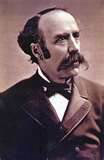 Horace Tabor This book was published in 1932 and I read it as research for my next novel. I have to say I found the book fascinating. It is really more about Horace Tabor than Silver Dollar (his daughter) and very little about Baby Doe (his second wife). Although the author claims solid research, he pretty much follows the legend of the Tabors to the letter. Having read Judy Nolte Temple's "Baby Doe Tabor - The Madwoman in the Cabin", I know his portrait of this family has inaccuracies. Still, I gained a lot of understanding of how Horace earned and lost his fortune. I think the author, Karsner, captured what Horace was about. This American pioneer had a great lust for life. Everything he did, he did in a big way. I found the practical first wife, Augusta, very likable. She was only the eleventh woman to live in Denver! Having heard the legend of Baby Doe as a child in Denver which, of course, was a big modern city then, I found this fact intriguing. What I didn't like about his book was Karsner's judgmental commentary. Silver Dollar is a tragic character and although what I learned made me sympathetic toward her and filled me with understanding, I didn't get a sympathetic vibe from the author. He gave absolutely no depth to Baby Doe. Even though he met with her in her cabin, he didn't ask her pointed questions. He says "I attempt no interview with Baby Doe. It would have been folly to do so. The story had been told to me many times by numerous people, probably with more clarity and authenticity than she could remember it and piece it together . . ." This made me think Karsner was a bit of a jerk. I got the feeling he (remember this book was released in 1932) didn't relate to women. Their personalities and actions are limited and shallow. Still, the author was able to bring a tear to my eye. I like how he writes and I'm glad I read this book. |
Here goes . . .I write novels. I've written screenplays, short stories, newsletters, business communications and articles. I'm not great at thank you notes. My sister is, but she doesn't know it. I'm not much for blogging. Don't have something to say worth reading everyday. But this is a blog and we'll see what turns up. Archives
June 2024
Categories
All
|

 RSS Feed
RSS Feed
